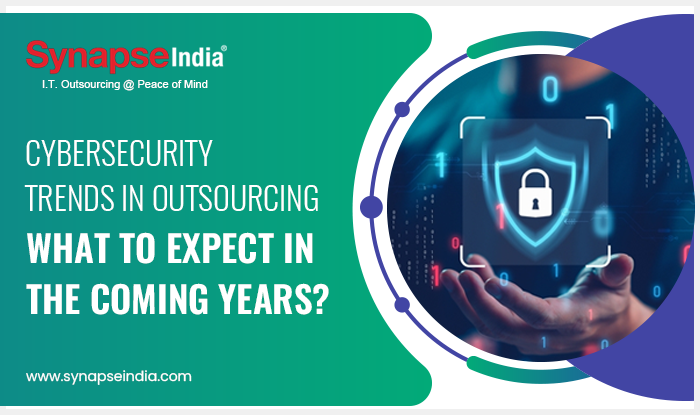 11 Dec 2023
11 Dec 2023“When a business outsources certain tasks to external service providers, it involves sharing access, data, and potentially critical systems. Ensuring the security of these shared resources becomes mandatory.”

The global market of outsourcing is growing rapidly and is already continuing to evolve with an upward trajectory. Businesses are looking for outsourcing services that are helping their business to thrive, save time, and access global experts. The rapid evolution of outsourcing cybersecurity has brought unprecedented opportunities, but it has also given rise to new and sophisticated cyber threats. As organizations grapple with the complex task of safeguarding their digital assets, outsourcing has emerged as a strategic approach to fortify cybersecurity defenses. In this blog, we will delve into information technology outsourcing and its trends in outsourcing and cast a gaze into the future to anticipate what lies ahead in the realm of digital security.

Cybersecurity discipline include practices, technologies, and strategies designed to protect digital systems, networks, and data from unauthorized access, attacks, and damage. Outsourcing cybersecurity serves as a digital fortress, shielding organizations from an array of cyber threats such as malware, phishing, ransomware, and data breaches.
.png)
The widespread adoption of information technology outsourcing has prompted a shift in cybersecurity strategies. Outsourcing cloud security to specialized providers ensures that data stored and processed in the cloud remains secure. Cloud security services often include data encryption, access controls, and continuous monitoring to safeguard against evolving threats.
Managed Security Service Providers (MSSPs) manage and enhance the cybersecurity posture. It offers a range of services, including threat detection, incident response, and security monitoring, allowing businesses to benefit from specialized expertise without the burden of maintaining an in-house security team.
Traditional perimeter-based security models are giving way to the Zero Trust Architecture (ZTA), which assumes that threats may exist both outside and inside the network. By implementing cybersecurity trends strict access controls and continuous monitoring, organizations adopting ZTA reduce the risk of unauthorized access and lateral movement within their networks.
As endpoints become prime targets for cyber attacks, EDR solutions are gaining prominence. Outsourcing EDR services enables organizations to detect and respond to advanced threats targeting endpoints. EDR providers leverage advanced analytics and threat intelligence to identify and neutralize threats in real time.
AI and ML are revolutionizing cybersecurity by enabling automated threat detection and response. Outsourced cybersecurity trends and solutions often leverage these technologies to analyze vast datasets, identify patterns, and detect anomalies indicative of potential security incidents. This proactive approach enhances threat detection capabilities and reduces response times

With the growing sophistication of cyber threats, organizations will prioritize cybersecurity education and training for their employees. Information technology outsourcing includes raising awareness about phishing attacks, implementing secure coding practices, and fostering a culture of security awareness throughout the organization.
As quantum computing advances, there is a looming threat to traditional cryptographic algorithms. In response, organizations will increasingly explore and adopt quantum-safe cryptographic solutions to ensure the long-term security of their sensitive data.
Governments and regulatory bodies worldwide are expected to introduce and enforce more stringent cybersecurity regulations. Organizations will need to stay abreast of evolving compliance requirements, with outsourcing cybersecurity partners playing a crucial role in helping them navigate the regulatory landscape.
The concept of Cybersecurity as a Service (CSaaS) is likely to gain momentum, offering organizations flexible and scalable cybersecurity solutions tailored to their specific needs. CSaaS providers will deliver a range of security services, allowing organizations to choose and customize their cybersecurity trends offerings based on their unique requirements.
Automation and orchestration will play a central role in streamlining cybersecurity operations. Organizations will increasingly rely on automated tools and orchestrated workflows to respond rapidly to security incidents, reducing manual intervention and improving overall efficiency.
In the world of cybersecurity, outsourcing has become a crucial component of organizational defense strategies. The trends outlined above illustrate the industry's response to the dynamic and sophisticated nature of cyber threats. As organizations look to the future, a proactive and collaborative approach to outsourcing cybersecurity, coupled with strategic outsourcing partnerships, will be essential to fortify digital defenses and navigate the challenges that lie ahead. By staying vigilant, cybersecurity trends and emerging technologies, and fostering a culture of cybersecurity, businesses can build resilient defenses against the ever-changing threat landscape.


